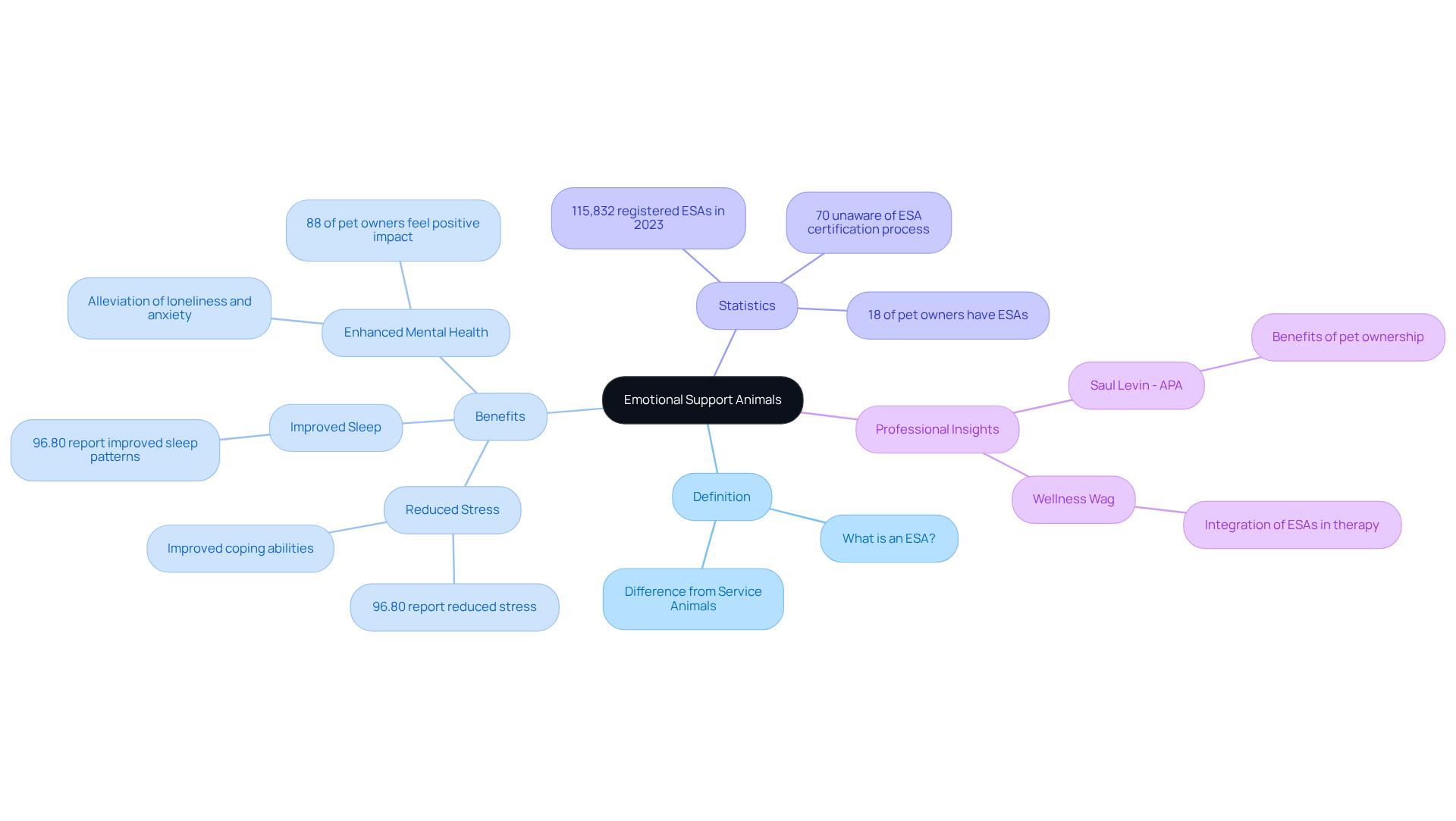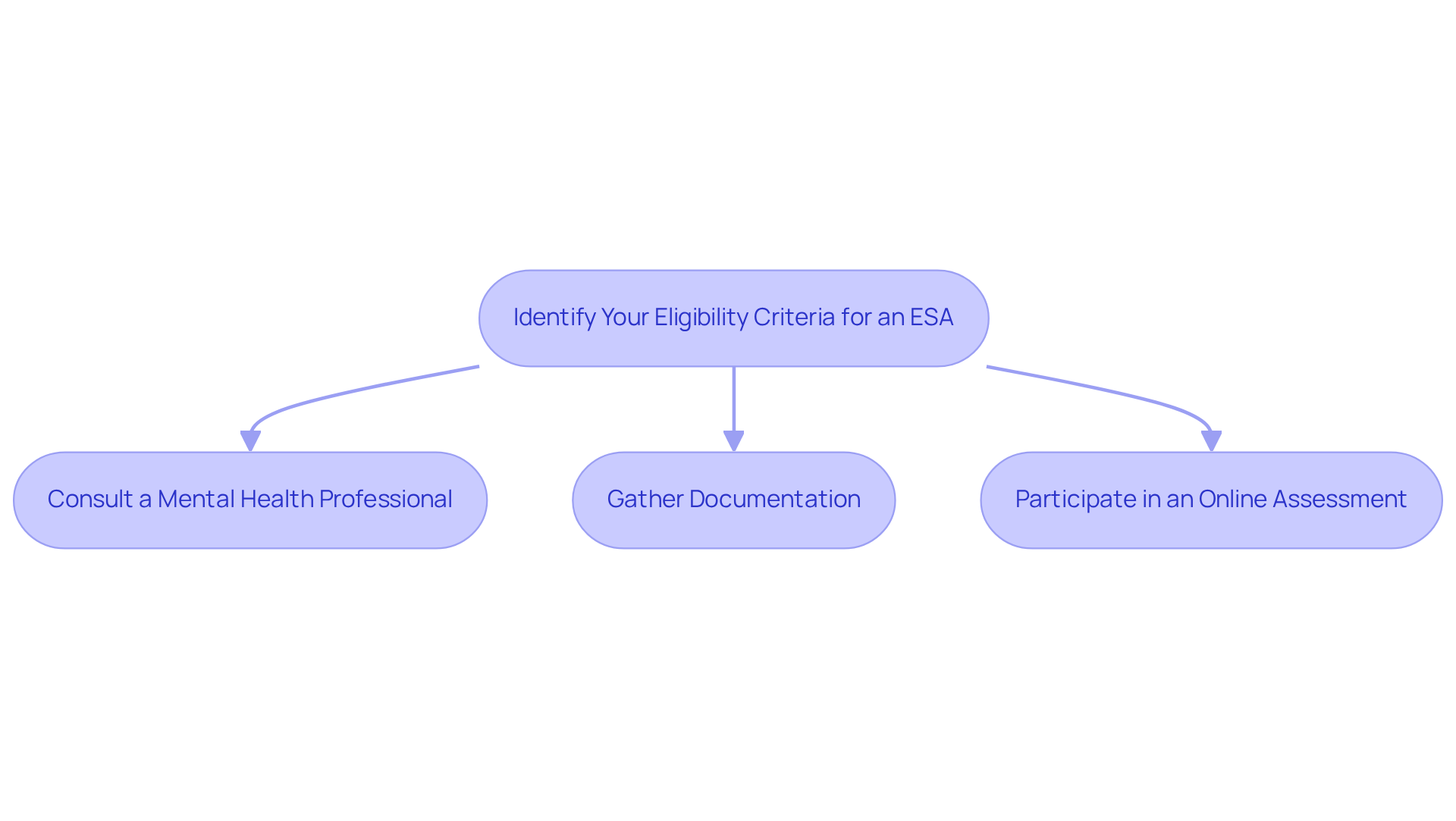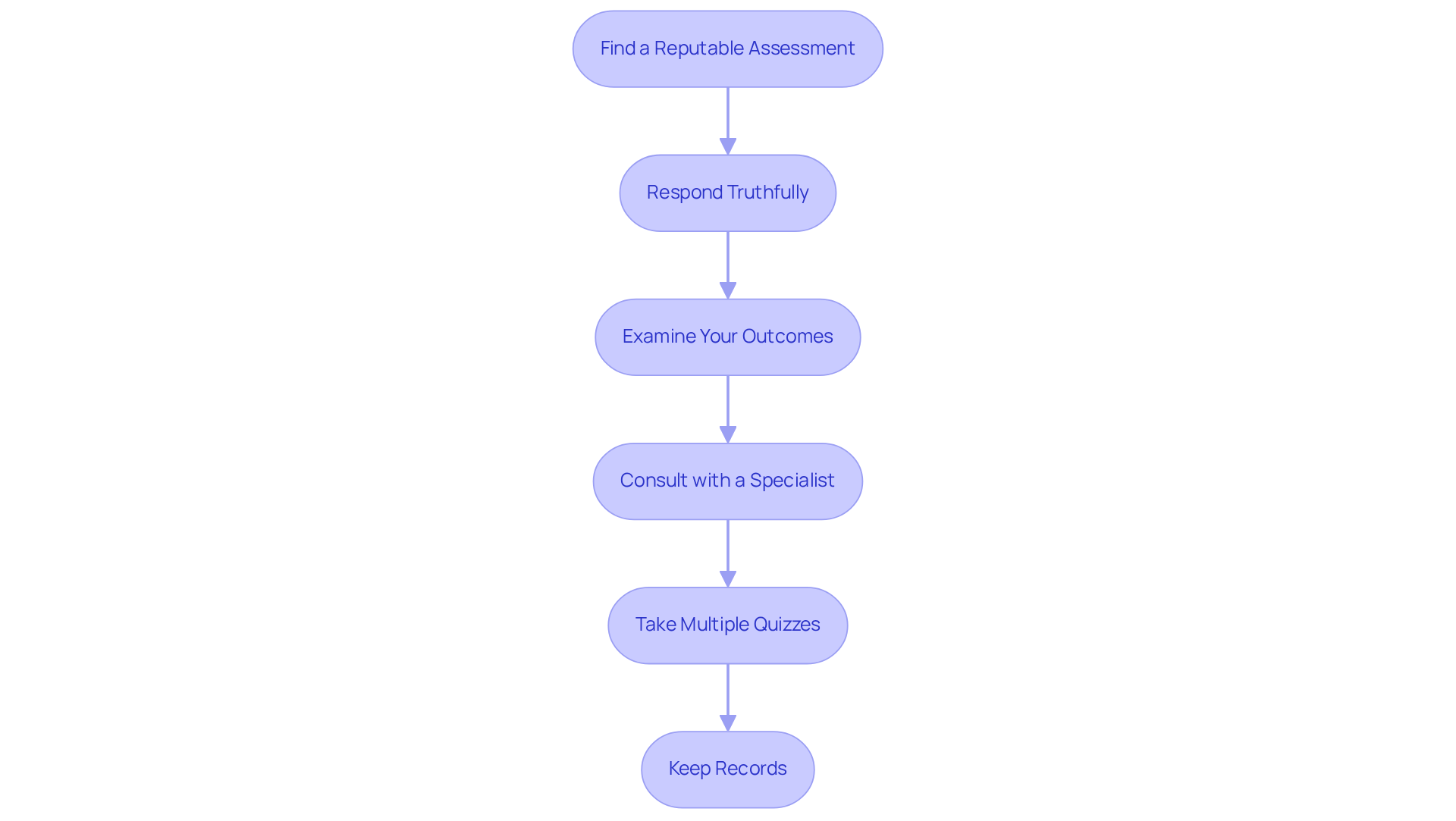

Do I Qualify for an ESA Quiz: Assess Your Eligibility Today
by Lena Park
Last updated: July 24, 2025
Verified and Approved by:
Angela Morris,
MSW, LCSW
Fact Checked

Overview
This article thoughtfully addresses the question of eligibility for an Emotional Support Animal (ESA) by outlining the essential criteria that individuals must meet. It begins by recognizing the emotional challenges faced by many, particularly those with diagnosed mental health conditions. These individuals often feel overwhelmed and in need of support, and an ESA can provide that crucial companionship and comfort.
To qualify for an ESA, it is important to demonstrate the need for support, which can significantly enhance one’s mental well-being. Consulting with a mental health professional is a vital step in this process. They can offer guidance and clarity regarding eligibility, ensuring that individuals receive the support they deserve.
Completing an ESA assessment quiz can also be beneficial, as it helps clarify one’s situation and guides the process of obtaining an ESA letter. This letter serves as a compassionate solution, affirming the individual’s need for an ESA and paving the way for the support they seek.
Ultimately, the journey toward securing an ESA is about finding solace and support. Remember, you are not alone in this process; there are resources and professionals ready to help you navigate your path toward improved mental well-being.
Introduction
Determining eligibility for an Emotional Support Animal (ESA) can be a pivotal step for individuals seeking comfort and companionship during challenging emotional times. Many face significant struggles with their mental well-being, often feeling isolated and overwhelmed.
These cherished animals play a unique role in enhancing emotional health, yet the criteria for qualification can often feel daunting. What if a simple quiz could illuminate whether an ESA is the right fit, guiding individuals toward the support they truly need?
By recognizing these emotional challenges, we can better understand the profound impact that an ESA can have, offering not just companionship but a pathway to healing and comfort.
Understand the Basics of Emotional Support Animals
Emotional Support Animals (ESAs) are beloved pets that offer comfort and assistance to individuals grappling with emotional or psychological challenges. Unlike service animals, which are specifically trained to perform tasks for individuals with disabilities, ESAs do not require specialized training. Their primary role is to provide companionship, helping to ease feelings of loneliness, anxiety, and depression. To determine if any domesticated animal, such as dogs, cats, and even rabbits, can qualify as an ESA, you might consider taking a ‘do I qualify for an esa quiz’ based on individual needs and preferences.
Understanding the distinction between emotional support animals and service animals is crucial for those considering the necessity of an ESA. While service animals are protected under the Americans with Disabilities Act (ADA) and are required to perform specific tasks, ESAs do not enjoy the same legal protections. Nonetheless, they play a vital role in enhancing mental well-being. Research shows that an impressive 96.80% of ESA owners report reduced stress and improved sleep patterns, underscoring the positive influence these animals can have on emotional health.
As of 2023, there are over 115,832 registered emotional support animals in the United States, reflecting a growing acknowledgment of their benefits. Mental wellness professionals are increasingly integrating ESAs into therapeutic practices, recognizing their ability to provide emotional stability and support. For many individuals, the companionship of an ESA can be a key component of their mental wellness journey, offering a sense of security and routine that significantly enhances overall well-being.

Identify Your Eligibility Criteria for an ESA
Individuals often wonder, ‘do I qualify for an ESA quiz?’ as they face specific eligibility criteria that can feel overwhelming. Understanding these requirements can be the first step toward finding the support you need.
Mental Well-Being Diagnosis: A diagnosed mental condition, such as anxiety, depression, PTSD, or other emotional disorders, is essential. This diagnosis should be made by a licensed mental care professional. It’s important to recognize that studies show around 18% of pet owners in the U.S. possess emotional support animals, highlighting the prevalence of mental health challenges that can benefit from this assistance.
Need for Support: Demonstrating that the presence of an ESA is necessary for your emotional well-being is crucial. A letter from your therapist or psychiatrist can affirm that the animal provides therapeutic benefits. Licensed professionals stress the significance of this connection, noting that pets can significantly alleviate feelings of loneliness and anxiety, offering a comforting presence during tough times.
No Specific Training Required: Unlike service animals, ESAs do not require specific training. However, it is essential for them to be well-behaved and not pose a threat to others. This flexibility allows a wider range of pets to serve as emotional support, making it easier for individuals to find companionship that resonates with their needs.
Living Situation Considerations: If you reside in a pet-restricted environment, having an ESA letter can help secure your right to keep your animal as a reasonable accommodation under the Fair Housing Act. This is particularly relevant, as disability discrimination accounted for over 52% of fair housing complaints in 2023, underscoring the importance of having the right support.
Steps to Assess Your Eligibility:
- Consult a Mental Health Professional: Consider scheduling an appointment to discuss your mental health needs and explore the potential benefits of having an ESA.
- Gather Documentation: Collect any relevant medical records or letters that support your case for needing an ESA. This documentation can be vital in establishing your need for support.
- Participating in an online assessment can help you answer the question, do I qualify for an ESA quiz, and provide additional insights into your situation, helping you understand your needs better.
At Wellness Wag, we understand the importance of having the right support in your life. We offer a streamlined process to help you obtain a legitimate ESA letter. After a quick assessment of your emotional support needs, we connect you with a licensed medical doctor for a personalized consultation. Once confirmed, you’ll receive a professionally crafted ESA letter with legal recognition within 24 hours of your consultation, ensuring you have the support you deserve.

Complete the ESA Assessment Quiz
Completing an ESA assessment test can help answer the question, do I qualify for an esa quiz regarding your eligibility for emotional support. Here’s a compassionate approach to navigating this process:
-
Find a Reputable Assessment: Seek out an assessment from a trusted source, such as a mental health organization or a reputable ESA service provider. It’s important that the assessment is designed to evaluate your emotional and psychological needs, ensuring you receive the support you deserve.
-
Respond Truthfully: As you engage with the assessment, please answer all questions honestly. Your truthful responses are crucial; they will directly influence the results and any recommendations made, guiding you toward the support you need.
-
Examine Your Outcomes: After completing the assessment, take the time to review the results carefully. Many assessments provide insights into whether you meet the general criteria for an ESA and suggest next steps. Research indicates that over 70% of individuals who participate in reputable ESA assessments find them beneficial in understanding their eligibility, helping them answer the question, ‘do I qualify for an esa quiz,’ which can be a comforting realization.
-
Consult with a Specialist: Use the assessment results as a foundation for a discussion with a mental health expert. They can help interpret the findings and guide you on the next steps to obtain an ESA letter if you qualify, ensuring you feel supported throughout this journey.
Additional Tips:
- Take Multiple Quizzes: Consider taking quizzes from various sources to gain a well-rounded view of your eligibility. Research shows that individuals who compare results from different tests are more likely to accurately assess their needs, which can be empowering.
- Keep Records: Document your assessment results and any notes from discussions with professionals. This documentation can be vital in supporting your ESA application process, providing evidence of your eligibility and needs.
Importance of Accurate Self-Assessment: Mental health organizations emphasize the importance of accurate self-assessment for ESAs, highlighting that a well-informed approach can lead to improved outcomes for those seeking emotional support. By understanding your needs through these quizzes, you can take meaningful steps toward obtaining the support you require, fostering a sense of hope and connection.

Conclusion
Emotional Support Animals (ESAs) play a crucial role in enhancing the well-being of individuals grappling with emotional or psychological challenges. It’s important to understand the eligibility criteria and the process to determine if one qualifies for an ESA, especially for those seeking support. By taking the time to assess personal needs and gather the necessary documentation, individuals can open the door to the companionship and comfort that an ESA can provide.
This journey begins with:
- Consulting mental health professionals
- Identifying specific needs
- Completing reputable assessments to determine eligibility
Key factors include:
- Having a diagnosed mental health condition
- Recognizing the need for support
- Noting that ESAs do not require specific training
The growing acceptance of ESAs in therapeutic practices highlights their vital role in promoting mental wellness.
Pursuing an emotional support animal can be a transformative step toward improved mental health and emotional stability. Engaging in self-assessment and seeking professional guidance empowers individuals to navigate this process effectively. By acknowledging the profound impact that ESAs can have on emotional well-being, individuals are encouraged to take proactive steps in exploring their eligibility and finding the support they truly deserve.
Frequently Asked Questions
What is an Emotional Support Animal (ESA)?
An Emotional Support Animal (ESA) is a beloved pet that provides comfort and assistance to individuals facing emotional or psychological challenges. Unlike service animals, ESAs do not require specialized training and primarily offer companionship to help alleviate feelings of loneliness, anxiety, and depression.
How do ESAs differ from service animals?
The main difference is that service animals are specifically trained to perform tasks for individuals with disabilities and are protected under the Americans with Disabilities Act (ADA). In contrast, ESAs do not have the same legal protections and are not required to perform specific tasks.
What types of animals can qualify as an ESA?
Any domesticated animal, such as dogs, cats, and even rabbits, can qualify as an ESA, depending on individual needs and preferences.
What are the benefits of having an ESA?
Research indicates that 96.80% of ESA owners report reduced stress and improved sleep patterns, highlighting the positive impact these animals can have on emotional health and overall well-being.
How many registered ESAs are there in the United States as of 2023?
As of 2023, there are over 115,832 registered emotional support animals in the United States, reflecting a growing acknowledgment of their benefits.
How are ESAs integrated into therapeutic practices?
Mental wellness professionals are increasingly incorporating ESAs into therapeutic practices, recognizing their ability to provide emotional stability and support for individuals on their mental wellness journey.
Certify Your Emotional Support Animal Today

Why You Can Rely on Us?
At Wellness Wag, we believe your pet deserves care rooted in both science and compassion. Each article is carefully researched, written in clear language for pet owners, and then reviewed by qualified professionals to ensure the information is evidence-based, current, and practical for real-life care. Our goal is to help you feel confident in making informed decisions about your pet’s health and well-being.
Reviewed by
Angela Morris, MSW, LCSW
Angela is a licensed clinical social worker with 20 years of experience in patient advocacy and community mental health. She has assisted numerous clients with ESA evaluations and brings a deep understanding of disability accommodations, ensuring that all information is accurate, supportive, and practical.

Written by :
Lena Park
Last Updated :
July 24, 2025












